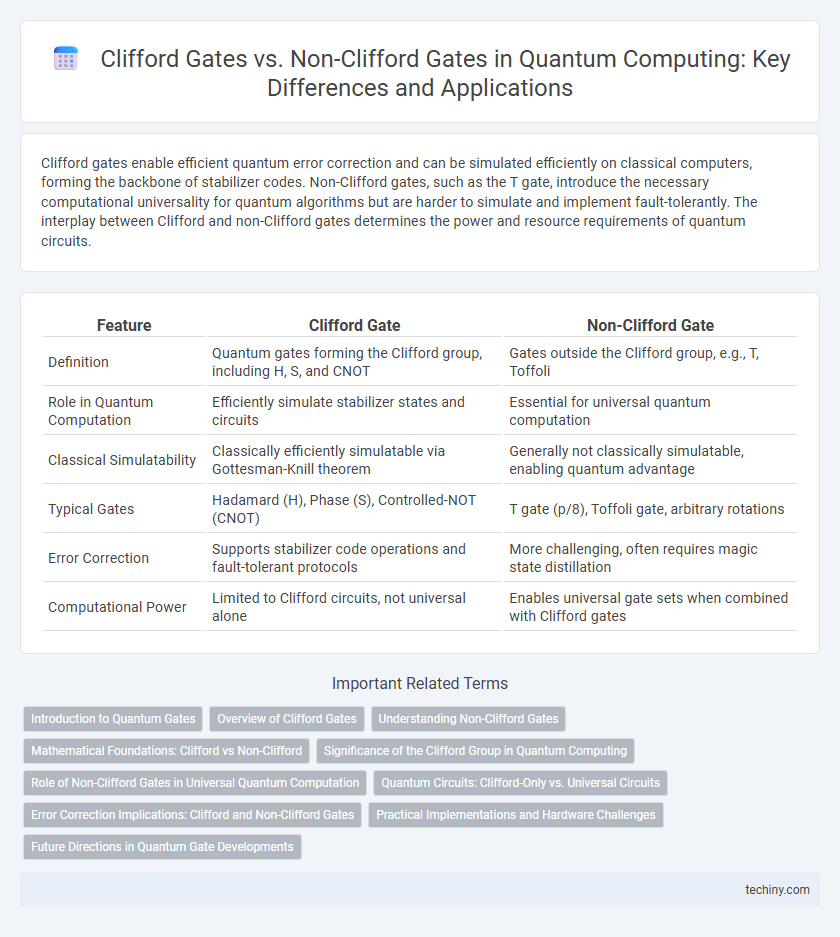Clifford gates enable efficient quantum error correction and can be simulated efficiently on classical computers, forming the backbone of stabilizer codes. Non-Clifford gates, such as the T gate, introduce the necessary computational universality for quantum algorithms but are harder to simulate and implement fault-tolerantly. The interplay between Clifford and non-Clifford gates determines the power and resource requirements of quantum circuits.
Table of Comparison
| Feature | Clifford Gate | Non-Clifford Gate |
|---|---|---|
| Definition | Quantum gates forming the Clifford group, including H, S, and CNOT | Gates outside the Clifford group, e.g., T, Toffoli |
| Role in Quantum Computation | Efficiently simulate stabilizer states and circuits | Essential for universal quantum computation |
| Classical Simulatability | Classically efficiently simulatable via Gottesman-Knill theorem | Generally not classically simulatable, enabling quantum advantage |
| Typical Gates | Hadamard (H), Phase (S), Controlled-NOT (CNOT) | T gate (p/8), Toffoli gate, arbitrary rotations |
| Error Correction | Supports stabilizer code operations and fault-tolerant protocols | More challenging, often requires magic state distillation |
| Computational Power | Limited to Clifford circuits, not universal alone | Enables universal gate sets when combined with Clifford gates |
Introduction to Quantum Gates
Quantum gates manipulate qubits through specific unitary operations, with Clifford gates, including the Hadamard, Phase, and CNOT gates, forming a subgroup that efficiently stabilizes quantum states and enables error correction. Non-Clifford gates, such as the T-gate, introduce necessary computational universality by enabling transformations outside the Clifford group, essential for quantum algorithms like Shor's and Grover's. Understanding the interplay between Clifford and non-Clifford gates is crucial for designing fault-tolerant quantum circuits and optimizing quantum error correction codes.
Overview of Clifford Gates
Clifford gates, including the Hadamard, Phase, and CNOT gates, are fundamental quantum operations that preserve the Pauli group under conjugation, enabling efficient classical simulation through the Gottesman-Knill theorem. They form the backbone of stabilizer codes and quantum error correction protocols, providing a structured framework for fault-tolerant quantum computing. Though limited in computational universality, Clifford gates simplify circuit design and analysis by maintaining the stabilizer formalism.
Understanding Non-Clifford Gates
Non-Clifford gates extend the computational power of quantum circuits beyond the stabilizer framework defined by Clifford gates, enabling universal quantum computation. These gates, such as the T-gate, introduce essential non-linearity and complexity that are necessary for quantum algorithms to outperform classical counterparts. Understanding the role of non-Clifford gates is crucial for quantum error correction, fault tolerance, and optimizing gate synthesis in advanced quantum processors.
Mathematical Foundations: Clifford vs Non-Clifford
Clifford gates form a subgroup of the unitary group generated by Pauli matrices, preserving the Pauli group under conjugation and enabling efficient classical simulation through the Gottesman-Knill theorem. Non-Clifford gates lie outside this subgroup and introduce quantum computational universality, requiring resources such as magic states for fault-tolerant quantum computation. The mathematical distinction centers on the stabilizer formalism, where Clifford gates map stabilizer states within a closed set, whereas non-Clifford gates extend computational capabilities beyond stabilizer operations.
Significance of the Clifford Group in Quantum Computing
The Clifford group plays a crucial role in quantum computing by enabling efficient classical simulation of stabilizer states and error correction in quantum circuits. Clifford gates, such as the Hadamard, Phase, and CNOT gates, preserve the Pauli group under conjugation, facilitating fault-tolerant quantum operations. Non-Clifford gates, like the T gate, are essential for universal quantum computation but introduce complexity due to their inability to be efficiently simulated classically, highlighting the significance of the Clifford group in balancing computational power and error management.
Role of Non-Clifford Gates in Universal Quantum Computation
Non-Clifford gates are essential in universal quantum computation because they enable operations beyond the stabilizer formalism achievable by Clifford gates alone. While Clifford gates facilitate efficient error correction and state preparation, non-Clifford gates, such as the T-gate, introduce the necessary complexity to implement arbitrary unitary transformations. The combination of Clifford and non-Clifford gates forms a universal gate set, allowing quantum algorithms to solve classically intractable problems.
Quantum Circuits: Clifford-Only vs. Universal Circuits
Clifford gates, forming the Clifford group, enable efficient classical simulation and underpin stabilizer circuits essential for quantum error correction, but they lack universality for quantum computation. Non-Clifford gates, such as the T gate, introduce the necessary complexity to achieve universal quantum circuits by enabling operations beyond stabilizer states. Combining Clifford gates with a minimal set of non-Clifford gates allows for universal quantum circuits that can implement any quantum algorithm, crucial for practical quantum computing advancements.
Error Correction Implications: Clifford and Non-Clifford Gates
Clifford gates enable efficient error correction using stabilizer codes due to their ability to map Pauli operators to Pauli operators, facilitating fault-tolerant quantum circuits. Non-Clifford gates, essential for universal quantum computation, complicate error correction since they transform stabilizers into non-Pauli operators, requiring more complex fault-tolerant protocols like magic state distillation. Balancing the integration of Clifford and non-Clifford gates is critical for optimizing error correction strategies and achieving scalable, reliable quantum computing.
Practical Implementations and Hardware Challenges
Clifford gates, including the Hadamard, Phase, and CNOT gates, enable efficient quantum error correction and are easier to implement on current quantum hardware due to their compatibility with stabilizer codes. Non-Clifford gates like the T gate introduce necessary universality for quantum algorithms but demand significantly higher fidelity and complex fault-tolerant protocols, such as magic state distillation, increasing hardware overhead. Practical quantum computing architectures balance Clifford and non-Clifford gate operations to optimize error rates and coherence times while addressing control electronics and qubit connectivity constraints.
Future Directions in Quantum Gate Developments
Future quantum gate developments will emphasize enhancing non-Clifford gate implementation fidelity to achieve universal quantum computation, as Clifford gates alone enable efficient classical simulation but lack computational completeness. Research into error-corrected non-Clifford gates, such as T-gates and Toffoli gates, is critical for advancing fault-tolerant quantum algorithms. Innovations in physical qubit architectures and optimized synthesis techniques aim to reduce resource overhead and improve scalability of complex gate sets beyond Clifford group operations.
Clifford gate vs non-Clifford gate Infographic

 techiny.com
techiny.com